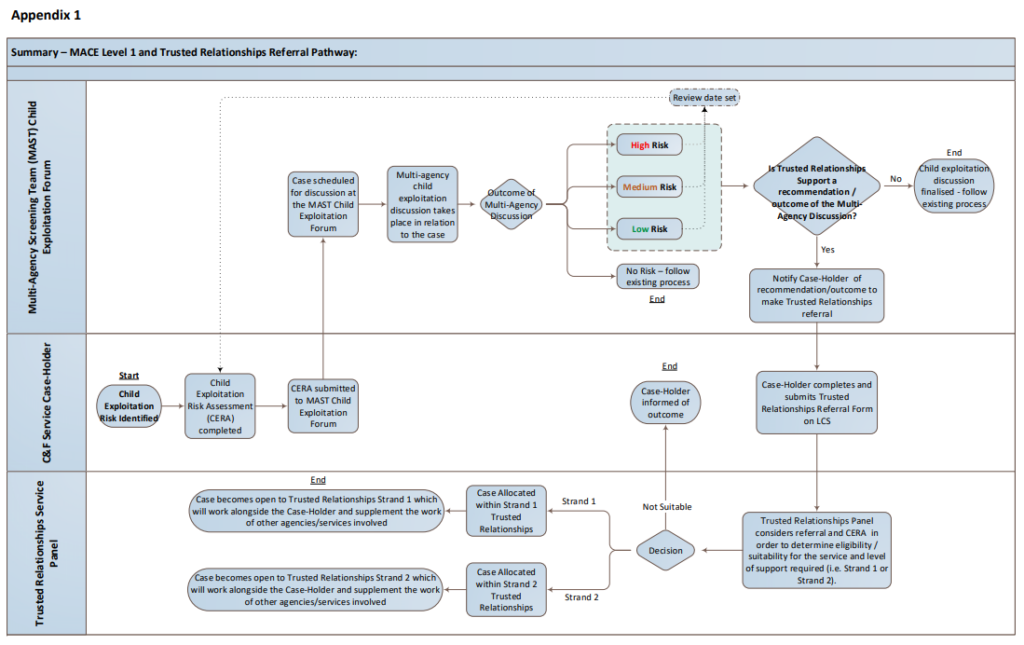Trusted Relationship Service
What is the Trusted Relationship Service?
The North Yorkshire Trusted Relationships Service has been operational since 2019 and offers support for children and young people who are identified as being at risk of or subject to Child Criminal Exploitation (CCE) (which may also include elements of other forms of exploitation such as Child Sexual Exploitation (CSE), Online Child Exploitation (OCE), County Lines, and Modern Slavery & Human Trafficking MSHT)). In terms of eligibility to be considered for a referral for Trusted Relationships support, a young person must be aged 17 or below, have an exploitation risk status assigned and be open to a Children & Families (C&F) Service.
Underpinning the support offered through the Trusted Relationships Service is a relational, trauma‐informed, and strengths‐based practice approach to harness the power of relational repair and development. This approach ensures we work alongside the young person and develop a positive trusted relationship, from which we can support young people to reduce the exploitation risk they face. Central to the delivery model is the understanding that positive Trusted Relationships are a key enabler for change. The Trusted Relationships service offers highly flexible packages of support to foster positive relationships and promote the development of protective factors that build resilience in vulnerable young people.
Trusted Relationships Support:
Trusted Relationships is a unique support offer, which supplements the work of other services in North Yorkshire.
Strand 1:
Support for children and young people who are identified as being vulnerable or at risk of CCE. Delivery is through Restorative Practice (RP) Workers who are trained to facilitate restorative practice. These workers have all had previous involvement with Children and Families Services and would become the ‘Trusted Relationship’. The primary role of the RP Workers is to develop a ‘Trusted Relationship’ to help build resilience, self‐esteem, and self‐efficacy. The RP Workers are appropriately trained and supervised and the relevant operational manager is responsible for matching the young people to suitable RP Workers.
Strand 2:
Specialist mentor support for young people identified as being at risk of or subject to CCE. Delivery across North Yorkshire is through Family Network Coordinators (FNCs) who are trained to effectively deliver a continuum of restorative approaches including Restorative Practice and Family finding to support children, young people, and their families. The FNCs will be responsible for building a positive relationship with the young person, the identification of connections with trusted adults, referral to the Family Group Conference / Lifelong Links process if necessary, and to develop resiliency within young people and their family / wider network to build sustainability post‐involvement.
Accessing Support through ‘Trusted Relationships’
To avoid the implementation of parallel pathways and ensure children and young people most in need of this support are identified at the earliest opportunity, the referral process for Trusted Relationships has been fully integrated within the designated Child Exploitation process for North Yorkshire. As such, as a precursor to making a Trusted Relationships referral, the C&F Service case‐holder must first route the case through the Multi‐Agency Child Exploitation (MACE) Level 1 process, which requires the case to become open to a C&F service to complete a Child Exploitation Risk Assessment (CERA) in conjunction with partners. Once completed, the CERA is then sent to the Multi‐Agency Screening Team (MAST) Child Exploitation forum for a multi‐agency view of the risk level and scrutiny regarding the risk management around this child and the contextual safeguarding concerns. The MAST Child Exploitation forum also make recommendations in relation to the case and Trusted Relationships will be considered as one potential support option. If an outcome of the MAST discussion is that the case would be suitable for and would benefit from Trusted Relationships support, the case‐holder will be asked to consider making a referral to ensure the young person can receive Trusted Relationships support. Following submission of a referral, the case will be considered by the Trusted Relationships Panel. This panel will consider the CERA and referral and will allocate the case to receive support through the project. The pathway to access support through the Trusted Relationships programme is set out in the diagram on the following page (Appendix 1).
It has been agreed that agencies external to the C&F Service cannot submit a referral directly to the Trusted Relationships project; this is to ensure the existing child exploitation pathway is not bypassed. Taking this approach to manage referrals into the Trusted Relationships service, it delivers significant benefits, including:
- promoting consistency in how cases are considered, referred and allocated to the Trusted Relationships service
- ensuring there is multi‐agency agreement on the appropriateness of Trusted Relationships support in the context of the existing range of options and interventions available to children and young people vulnerable to or subject to different forms of exploitation
- ensuring the MACE Level 1 / MAST Child Exploitation forum retains oversight of children and young people within the local authority area at risk of or subject to exploitation
- ensuring case‐holding responsibility remains with the C&F Service, with the Trusted Relationships Service project supplementing the work of other agencies/services.
Contact
If you have any questions in relation to the North Yorkshire Trusted Relationships Service, please contact: Simon Saxton, Restorative Practice Lead, on Simon.Saxton@northyorks.gov.uk or Mike Lord, Trusted Relationships
Project Coordinator, on: Michael.Lord@northyorks.gov.uk

Page reviewed: June 2023




 View all our news
View all our news